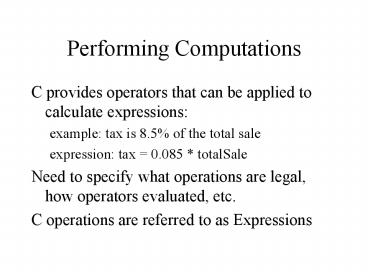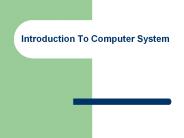Performing Computations - PowerPoint PPT Presentation
Title:
Performing Computations
Description:
Performing Computations. C provides operators that can be applied to calculate expressions: ... is called (invoked) which performs some set of computations and ... – PowerPoint PPT presentation
Number of Views:25
Avg rating:3.0/5.0
Title: Performing Computations
1
Performing Computations
- C provides operators that can be applied to
calculate expressions - example tax is 8.5 of the total sale
- expression tax 0.085 totalSale
- Need to specify what operations are legal, how
operators evaluated, etc. - C operations are referred to as Expressions
2
Outline
- II. Program Basics
- G. Expressions
- 1. Primary
- identifiers, constants, parenthesized expressions
- 2. Unary
- postfix function call, increment, decrement
- prefix sizeof, unary , unary -, cast,
increment, decrement - 3. Binary
- arithmetic ops - /
- assignment
- shorthand assignment
3
Outline (cont)
- II. Program Basics
- 4. Casting
- implicit
- promotion hierarchy
- explicit
- 5. Side effects
- 6. Resolving Expressions
- Precedence
- Associativity
- H. Statements
- 1. Expression
- 2. Compound
4
Expressions in C
- Example total TAXRATE
- Consists of a sequence of operators and operands
- operands total, TAXRATE
- can be expressions themselves
- operator
- operation calculating a result based on the
operand(s)
5
Some Expression Formats
- primary
- expressions that directly map to a value
- unary
- prefix operator operand
- postfix operand operator
- binary
- operand1 operator operand2
- ternary (operator in two parts)
6
Types for Operands
- Operators only apply to certain types
- e.g., addition applies to numbers
- Each operand must be of the appropriate type
- Operators calculate a value
- Value can then be used as operands to other
operators
7
Primary Expressions
- identifiers
- variable
- defined constant
- literal constants
- operands can be values of the appropriate type
- operator can have constant (e.g., 5, -34) as
operand
8
Binary Expressions
- expr1 op expr2
- arithmetic operators
- - binary addition (e.g., 5 3 result 8)
- - - binary subtraction (e.g., 5 - 3 result 2)
- - multiplication (e.g., 5 3 result 15)
- / - division (e.g., 5 / 3 result 1)
- - remainder (e.g., 5 3 result 2)
- arithmetic operators apply to number types,
result type depends on operand types
9
Arithmetic Operators
- Two int operands -gt int result
- Two float operands -gt float result
- / - division operator, is whole number division
for ints, floating point division for other
operands - - remainder operator, only works for int values
- Mixed operands (float/int) - result produced is
based on a promotion hierarchy, result cast to
higher type in hierarchy - e.g., 5 / 3.0 produces 1.666666
10
Promotion Hierarchy
- Operands of the lower type can be implicitly
converted to the higher type (in C) - Occurs when an operator expects the higher type
(adding together two floats when one is an int)
11
Assignment Expression
- varName expr
- value of expr determined
- result of expression is the value of expr
- as a side effect the value calculated is also
stored in the named variable (the current value
stored in the variable is replaced) - example
- current value of total is 5
- total 3
- replaces the value 5 with the value 3 in the
memory location corresponding to total
12
Assignment Expression (cont)
- varName expr
- expr value must be of the proper type to be
stored in the variable (error otherwise) - the value may be converted automatically using
the promotion hierarchy - example
- float f
- f 3 / 3 cast from an integer to a float
value /
13
Shorthand Assignments
- - /
- example
- x 3
- is a shorthand for
- x x 3
- assuming x is 7 before x 3 is calculated, the
right-hand side x 3 is calculated, producing
10, this value is then stored in x, and the
result of the expression is 10 - thus, these operators also have side effects
14
Unary Expressions
- Postfix
- fName(arglist) - function call
- subprogram is called (invoked) which performs
some set of computations and returns a value
(more later) - Prefix
- sizeof (expr) - expr can be any primary
expression or the name of a type, operator
returns num bytes used to represent type (int) - expr - unary plus (applies to numbers, no
effect) - - expr - unary minus (inverts sign of numbers)
15
Cast Operator (Unary Prefix Op)
- (TypeName) expression
- conversion forces expression value from current
type to the provided type - example (float) 5 results in 5.0
- especially useful for division
- example
- totalScore, totalGrades (ints)
- totalScore / totalGrades produces integer
- (float) totalScore / totalGrades casts totalScore
to a floating point number, then division occurs
16
Prefix Increment, Decrement
- variable - prefix increment
- --variable - prefix decrement
- prefix unary operators
- example x is a shorthand for
- x x 1
- similarly --x is a shorthand for x x - 1
- apply to integral values (char, int)
- have side effect of changing value of variable
17
Postfix Increment, Decrement
- variable - postfix increment
- variable-- - postfix decrement
- postfix unary operators
- similar to prefix versions BUT different in the
value they produce - x is a shorthand for the statement x x 1
but the result of x is the value of x BEFORE
the value is changed - example assume x is 8, x changes x to 9 but
returns the value 8 - the postfix decrement operator works similarly
18
Side Effects
- Certain operations not only produce values, but
also perform other actions - assignment statements - change the value of
variable on left-hand side of operator - scanf operator - returns a value (number of
arguments read), but also changes variables in
scanf expression - example scanf(d,total) changes total
19
Complex Expressions
- Expressions can be composed to produce more
complex expressions - operand of expression can be an expression
- total totalSale TAXRATE totalSale
- three operators, , , , how is this expression
resolved?? - In C, TAXRATE totalSale is calculated, then
totalSale is added to this value, then this value
is stored in total - But why??
20
Resolving Complex Expressions
- C has precedence, associativity rules it uses to
determine the order operators are evaluated in - Precedence some operators are executed before
others - Associativity when more than one operator in an
expression has the same precedence then
associativity rules are used to order
21
Operator Precedence
- 18 Identifier, Constant, Parenthesized
Expression - 17 Function call
- 16 Postfix increment/decrement,
- 15 Prefix increment/decrement, sizeof, unary ,
unary - - 14 (Type) - cast operator
- 13 /
- 12 -
- 2 - /
22
Using Operator Precedence
- Example
- total totalSale TAXRATE totalSale
- has highest precedence, so TAXRATE totalSale
is calculated first - has next highest precedence, so the result of
TAXRATE totalSale is added to totalSale - has the lowest precedence, so the value
calculated in the previous operations is stored
in total
23
Parenthesized Expressions
- What if the precedence order is not what you
want? - example sale1 sale2 TAXRATE
- in this case the multiplication would happen
first, but you might want the addition first - answer parenthesize the expressions you want to
happen first - result (sale1 sale2) TAXRATE
- parenthesized expressions have highest precedence
24
Programming Tip Parenthesizing
- Does not hurt to include parentheses for all
expressions - Thus you can guarantee the order of evaluation
- Example
- total totalSale TAXRATE totalSale
- becomes
- total (totalSale (TAXRATE totalSale))
25
Associativity
- Rules determining how to evaluate expressions
containing more than one operator with the same
precedence - example is 5 - 4 - 3 ((5 - 4) - 3) or (5 - (4 -
3)) - its important because the values may differ
(e.g., -2 or 4 for the above possibilities) - Left associativity operators are evaluated left
to right - Right associativity evaluated right to left
26
Operator Associativity
- 18 Identifier, Constant, Parenthesized
Expression - 17 Function call (LEFT)
- 16 Postfix increment/decrement (LEFT)
- 15 Prefix increment/decrement, sizeof, unary ,
unary - (RIGHT) - 14 (Type) - cast operator (RIGHT)
- 13 / (LEFT)
- 12 - (LEFT)
- 2 - / (RIGHT)
27
Using Operator Associativity
- Evaluate operators by precedence
- When evaluating operators with the same
precedence, consult associativity rules - example 5 - 4 - 3, two - operators, so
associativity (left) is used - 5 - 4 - 3 evaluates to ((5 - 4) - 3) or -2
- Again, use parentheses to make sure things are
evaluated the way you expect
28
Composing Assignments
- Example
- x y 3 (x (y 3)) with Right
associativity - Ok to do, but better to avoid
- Example
- x is 4, what is the result of x y x 3 ?
- x 3 evaluated (producing 7), this value stored
to y, then the result stored back to x
29
Multiple Assignments
- In ANSI C, changing a variable multiple times in
the same expression produces an undefined result - example (b-- b--)
- is undefined, C may execute both b-- operators
together, the left b-- first, or the right b--
first - solution better not to do it
30
Statements
- Programs consist of sequences of statements
- Expressions can be used as part of various types
of statements - Expressions can also be used as stand-alone
statements - generally assignment expressions are issued as
separate statements
31
Expression Statements
- Format Expression
- When the statement is reached in the program the
expression is evaluated - Assignment statements cause side effects (change
the value of variables) - printf and scanf are actually functions that we
call (and produce values), so these are
expression statements
32
Compound Statements
- A block of code containing zero or more
statements - Contained between and
- Format
- Local Declarations
- Statements
33
Compound Statements (cont)
- Example
- int x / local declaration /
- x 3 / statements /
- y x 4
- printf(d\n,y)
- Block of statements treated as a unit
34
Compound Statements (cont)
- Local declarations exist during the execution of
the block/compound statement - Declarations are made one at a time
- Statements are executed from the first to the
last - Declarations go away once the statements in the
block are executed































